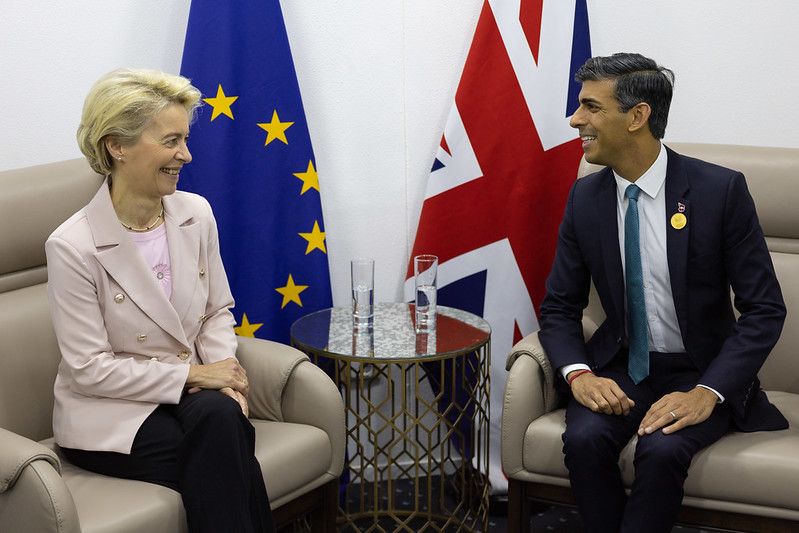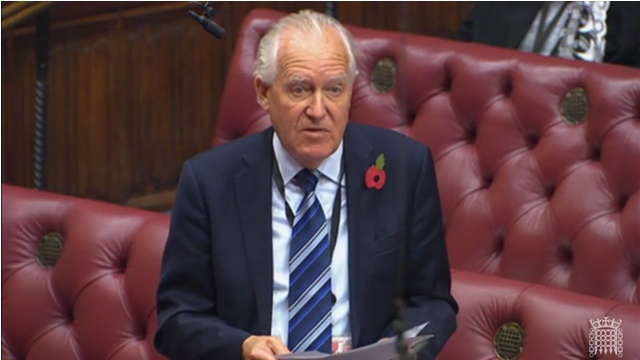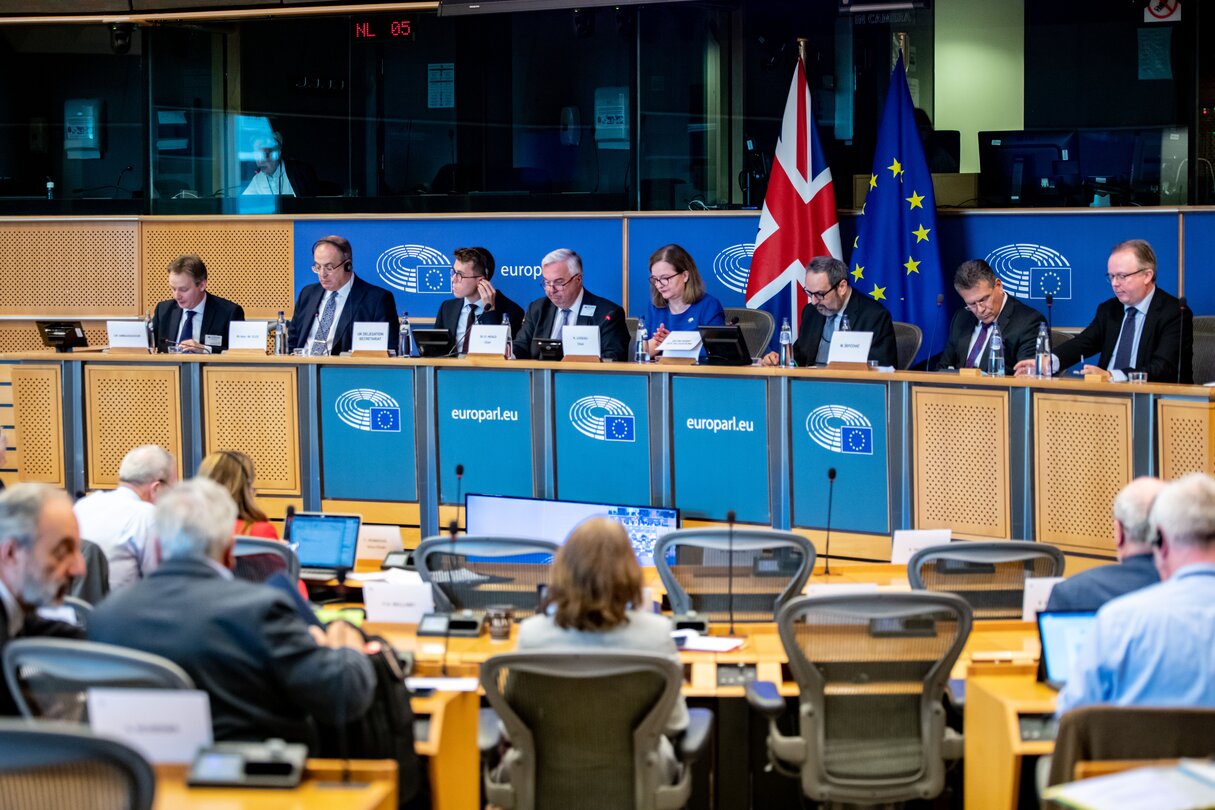Brexit & Beyond Newsletter
7 November 2022
Welcome to the 7 November 2022 Brexit & Beyond newsletter
An election will not be held in Northern Ireland before Christmas. Talks between the EU and UK on the Protocol continue, and the new Prime Minister will meet EU leaders at the COP27 summit in Egypt. The Lords Sub-Committee on the Protocol continues to hear evidence on the Government’s Protocol legislation, the Protocol and its implications, as well as ongoing talks and possible solutions. Lords continue their scrutiny of the Northern Ireland Protocol Bill at committee stage. The EU-UK Parliamentary Partnership Assembly is meeting today in London.
Secretary of State: no election before Christmas
On Friday 4 November, the Secretary of State for Northern Ireland Chris Heaton-Harris announced there will not be an Assembly election before Christmas. Heaton-Harris said, “I have had valuable conversations with people across Northern Ireland, including business and community representatives. I have listened to their sincere concerns about the impact and cost of an election at this time.” On Tuesday, the Secretary of State met with party leaders in NI to hear their various views on calling an election.
Reacting to the decision not to call an election, Michelle O’Neill (Sinn Féin) said that there is “no clarity or certainty” on what the NI Minister’s next steps are. Diane Dodds (DUP) said that the Secretary of State “should use this time wisely to ensure that the Protocol is replaced by arrangements that restore Northern Ireland’s place in the United Kingdom.” Alliance leader Naomi Long said, “History has shown that when elections are carried out in these circumstances they only serve to deepen divisions and allow new so-called red lines to emerge.” UUP leader Doug Beattie called for negotiations between the EU and UK to continue in earnest, and said that the UK should trigger Article 16 to facilitate this. SDLP leader Colum Eastwood stated, “We need to see the British government turn their attentions to restoring the Stormont institutions so that we can deal with the cost of living emergency and the looming recession.”
Under legislation passed in February, an election must be held within 12 weeks, as the deadline to restore the power-sharing institutions passed on 28 October. The Secretary of State previously said he would immediately call an election. Heaton-Harris will make a statement in Parliament this week to set out the next steps and will be taking questions from MPs on Wednesday.
Views on the Protocol negotiations: process and progress
On Wednesday 2 November, the Lords Sub-Committee on the Protocol heard evidence from Julian King, the UK’s last European Commissioner, and Peter Sheridan, CEO of Co-operation Ireland. On the Northern Ireland Protocol Bill, Sheridan said it was hard to understand the UK Government saying the Protocol is necessary to protect the Good Friday Agreement, and now saying that the Bill is necessary to protect the Agreement. He observed that the Bill would deal with a lack of consent within one community, but that may be replaced with wider lack of consent for this unilateral alternative.
EU-UK relations
Both King and Sheridan remarked that while there is little detail on PM Rishi Sunak’s policies on Northern Ireland, he is “economically a realist” and will likely want to avoid a dispute with the EU which could result in a trade war. Sunak is holding his first meetings with EU leaders since taking up his new role. Today, he met European Commission President Ursula von der Leyen at the COP27 summit in Egypt. The BBC reports from Brussels that talks between the EU and UK are “making slow progress” but that EU sources say they are waiting for the new Government to clearly set out its position.

UK Prime Minister Rishi Sunak meeting European Commission President Ursula von der Leyen | Source: Simon Walker / No 10 Downing Street
King suggested that some in the EU are taking an overly hard line in relation to the talks with the UK on the Protocol, (for example, in saying that the Protocol Bill should be withdrawn before progress can be made). He commented that while the EU recognises adjustments to the Protocol need to be made, they need to go further than their October 2021 proposals. Sheridan suggested that both the EU and UK could suspend their legal action (the UK’s Protocol Bill and EU’s infringement proceedings against the UK), to make it easier to reach an agreement.
Governance and process
Aside from the role of the European Court of Justice regarding governance issues and the ‘democratic deficit’ in the Protocol, King emphasised the lack of provision for NI voices in its management. He said that the EU-UK negotiations on the Withdrawal Agreement and Trade and Cooperation Agreement suffered from the absence of an official NI voice (the NI Executive wasn’t sitting during this period) and “the results reflect that absence”. King said the EU recognises the need for broader consent for the Protocol in NI. Sheridan highlighted comments from a former Permanent Secretary in the Northern Ireland Office that the process in the negotiations (one which engages key stakeholders to take ownership of the outcome), is as important as the outcome.
King remarked that while there are hopeful comments from UK side on the current talks, some in the EU have a “slightly cooler view” of those discussions. On the timescale, he said it seems quite difficult to reach a deal on some of the more complicated subjects in the next few weeks.
Northern Ireland Protocol Bill
The House of Lords continued its scrutiny of the Northern Ireland Protocol Bill at committee stage on Monday 31 October, and Wednesday 2 November. Peers debated amendments which would require the NI Assembly to give approval before the Bill could be used to disapply parts of the Protocol. Baroness Ritchie said, “The accountability mechanisms in the Northern Ireland Assembly must be recognised and adhered to if this Bill is passed. They must be given their say, because the vast majority of Assembly Members elected do not agree with this Bill.”
Lord Cormack (Conservative) said the amendments “are not going to change the fundamental nature of the Bill; they are not going to make it acceptable” and urged the Government to pause the Bill so that negotiations can take place “without any implicit threats”. An amendment was tabled which would require the Government to provide an impact assessment before using the delegated powers in the Bill. Lord Hannay said the Government is “proposing that we give them a blank cheque for that without telling us what the impact on the British economy or the economy of Northern Ireland might be. That is frankly bizarre. It is not truly credible.”

Former Secretary of State for Northern Ireland Lord Hain | Source: UK Parliament
Lord Hain (Labour) brought an amendment to protect the operation of the single electricity market on the island on Ireland. He told Lords, “It is either naive or disingenuous of the Government to claim that the single electricity market will be unaffected by the Bill: the position of the Court of Justice is absolutely essential to its operation…If the EU decides to prevent the continued free flow of goods and electricity across the Irish border because of the removal of the CJEU from the protocol, it would be not a sign of its malintent but rather a well-flagged consequence of the wanton recklessness of the Government in writing the Bill in this way.”
The final day of committee stage will be held today, 7 November.
EU-UK Parliamentary Partnership Assembly meets in London

The first meeting of the EU - UK Parliamentary Partnership Assembly in Brussels | Source: European Union 2022 - EP
The EU-UK Parliamentary Partnership Assembly (PPA) is meeting in Westminster today and tomorrow (7 and 8 November). The PPA was established in the UK-EU Trade and Cooperation Agreement (TCA) and is made up of 21 MPs and 14 Peers from the UK Parliament, and 35 Members of the European Parliament. Members of the Northern Ireland Assembly, Scottish Parliament and Senedd Cymru can attend the plenary meeting as observers. Declan Kearney (Sinn Féin) and Philip Brett (DUP) are attending from the Assembly. At this second meeting of the PPA, parliamentarians will discuss energy cooperation, relations with civil society and the devolved institutions, and will debate the future relationship between the UK and EU. Members will also participate in a number of thematic groups focusing on touring artists; cooperation on defence and security, with particular reference to cyberdefence and data exchange; and citizens’ rights. The plenary discussions will be live streamed on the UK Parliament YouTube channel. The Hansard Society has published a briefing on the PPA.
Other news
- The Northern Ireland Affairs Committee has received a response from Commons Leader Penny Mordaunt about scrutiny of the UK Government’s obligations under Article 2 of the Protocol. Mordaunt writes that officials are drafting guidance for Bill teams on Article 2 compliance.
- On 30 November – 1 December, the Supreme Court will consider the case brought by Jim Allister and others, which challenges the lawfulness and constitutionality of the Protocol on Ireland/Northern Ireland, arguing it is incompatible with the Act of Union. The panel will be Lord Reed, Lord Hodge, Lord Lloyd-Jones, Lord Sales, and Lord Stephens.
- The Retained EU Law Bill begins committee stage tomorrow, 8 November. The University of East Anglia Centre for Competition Policy has published a blog on the implications of the sunset clause for UK competition law.
- Minister of State for Trade Policy Greg Hands has written to the NI Affairs Committee, following his evidence session to the Committee in October. His correspondence includes information on the work of the Department for International Trade in Belfast, ‘at risk’ goods, and guidance on NI’s access to UK trade deals.
- MEPs from the European Parliament Committee for Civil Liberties, Justice and Home Affairs visited the UK last week (2-4 November) to discuss UK adequacy under the EU’s General Data Protection Regulation and the Law Enforcement Data Protection Directive.




